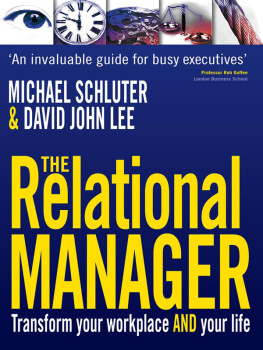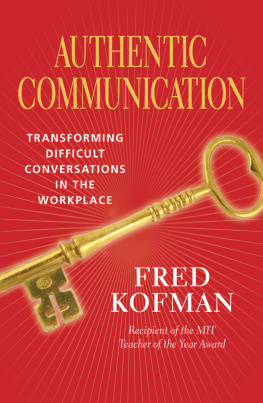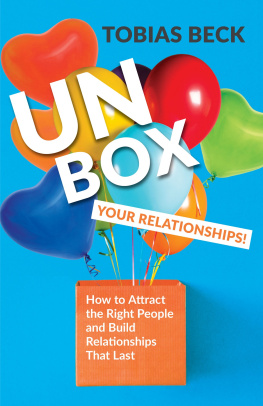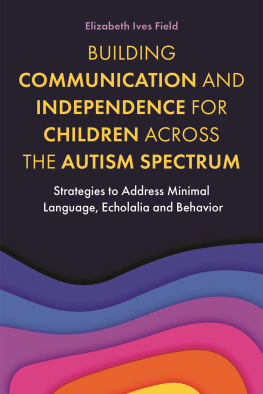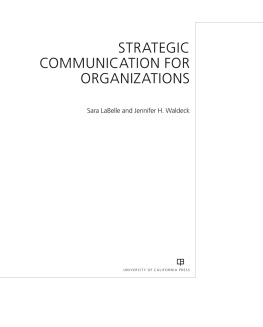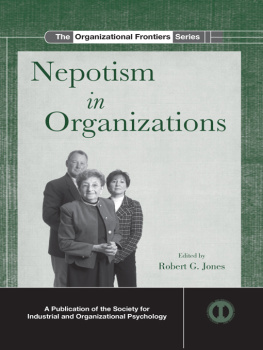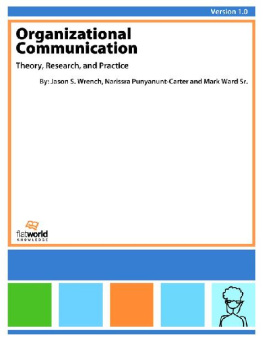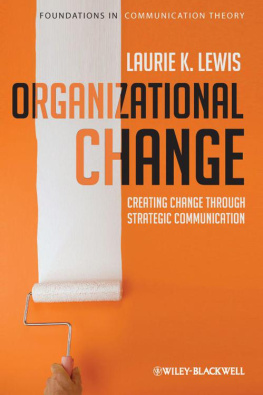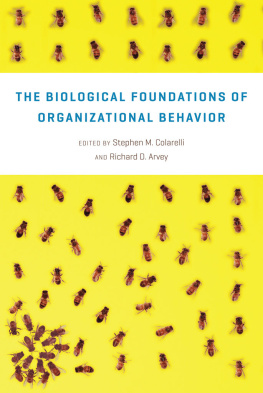Organizing
Relationships
To Rick, Val, and Rachel for all their love and support. And to my colleagues who make workplace relationships the best part of my job.
Organizing
Relationships
Traditional and Emerging
Perspectives on
Workplace Relationships
Patricia M. Sias
Washington State University

Copyright 2009 by SAGE Publications, Inc.
All rights reserved. No part of this book may be reproduced or utilized in any form or by any means, electronic or mechanical, including photocopying, recording, or by any information storage and retrieval system, without permission in writing from the publisher.
For information:
 | Sage Publications, Inc.
2455 Teller Road
Thousand Oaks, California 91320
E-mail: | Sage Publications India Pvt. Ltd.
B 1/I 1 Mohan Cooperative
Industrial Area
Mathura Road, New Delhi 110 044
India |
Sage Publications Ltd.
1 Olivers Yard
55 City Road
London EC1Y 1SP
United Kingdom | Sage Publications
Asia-Pacific Pte. Ltd.
33 Pekin Street #02-01
Far East Square
Singapore 048763 |
Printed in the United States of America
Library of Congress Cataloging-in-Publication Data
Sias, Patricia M., 1959
Organizing relationships: traditional and emerging perspectives on workplace relationships/Patricia M. Sias.
p. cm.
Includes bibliographical references and index.
ISBN 978-1-4129-5796-0 (cloth)
ISBN 978-1-4129-5797-7 (pbk.)
1. Interpersonal relations. 2. Organizational behavior. 3. Employees. 4. Work environmentSocial aspects. I. Title.
HD58.7.S553 2009
302.35dc22 2008026113
This book is printed on acid-free paper.
08 09 10 11 12 10 9 8 7 6 5 4 3 2 1
| Acquisitions Editor: | Todd Armstrong |
| Editorial Assistant: | Aja Baker |
| Production Editor: | Carla Freeman |
| Copy Editor: | Teresa Wilson |
| Typesetter: | C&M Digitals (P) Ltd. |
| Proofreader: | Penny Sippel |
| Indexer: | William Ragsdale |
| Cover Designer: | Candice Harman |
| Marketing Manager: | Carmel Schrire |
Contents
Preface
I have had many different types of jobs throughout my life. Prior to joining academia, I worked as a photocopy clerk, a pizza maker, a pear packer, a library assistant, a switchboard operator, a day camp counselor, a clerical assistant, a receptionist, a legal secretary, and a personnel manager. While all of these jobs differed with respect to tasks and responsibilities, all were similar in one fundamental waythe importance of the relationships I had with others at work.
In each job, including my current faculty position, I found my coworkers to be important sources of information and support. Whether the tasks were mundane or complex, my relationships with others made the jobs more interesting, more rewarding, and in some cases, at least more tolerable. My relationships with supervisors often transformed to mentoring relationships that I found helpful as I progressed through my career. As a personnel manager, I learned the importance and the difficulties of forming and maintaining trusting, high-quality relationships with employees. I also learned how challenging it can be to manage the tensions of blending friendship and supervision, of blending subjectivity and objectivity.
These were the experiences that turned my attention toward workplace relationships while studying for my doctoral degree at the University of Texas. With Fred Jablin as my advisor, I obtained a thorough understanding of supervisorsubordinate relationships. I was perplexed, however, by the lack of attention to other types of workplace relationships. In particular, I was troubled that scholars only rarely addressed peer relationships and workplace friendships, especially since I found those types of relationships to be particularly important to my working experience. As a result, my dissertation and program of research over the past 15 years has centered on workplace relationships.
In addition to studying workplace relationships, I also address them in my teaching. And a continual source of frustration for me in both my research and teaching is the lack of a comprehensive and interdisciplinary source of information. Rather, I have filled my office shelves with several different books about different aspects of different types of workplace relationships. My courses are generally based on one or more of these books and a usually cumbersome compilation of readings. One motivation for writing this book, therefore, was to create a useful and comprehensive resource for scholars from a variety of disciplines conducting research and teaching courses relevant to workplace relationships.
Another motivation stems from my dissatisfaction with the body of knowledge we have generated thus far regarding workplace relationships. Perhaps because of the interpersonal relationship foundation of workplace relationship scholarship, our research tends to be rooted firmly in the postpositivist tradition. The majority of researchers, myself included, tend to conceptualize and study workplace relationships of various types using social scientific or social-psychological approaches. While I acknowledge the value of this research, and the fact that my own research is largely grounded in postpositivism, I know that there is still much we do not know about workplace relationships. And much of this knowledge could be generated by scholars examining workplace relationships from other theoretical perspectives. Thus, this book is a call to scholars from a variety of disciplines to broaden our theoretical lens and, therefore, broaden and deepen our understanding of workplace relationships.
These two motivations provided two specific goals for this book. The first goal was to provide a comprehensive and organized discussion of the current body of knowledge of workplace relationships, including supervisorsubordinate relationships, peer coworker relationships, workplace friendships, romantic workplace relationships, and customer/client relationships, as well as links between workplace relationships and society. The term organizing relationships in the books title, therefore, has dual meaning. It both acknowledges relationships as a mechanism for organizing, and acknowledges my attempts at literally organizing existing workplace relationship research.
The second goal of the book was to develop a research agenda for the future. Specifically, my intent was to articulate the unique contributions that alternative theoretical perspectives, such as social construction theory, critical theory, and structuration theory, can provide to our understanding of workplace relationships. My hope is that this book will inspire scholars to pursue innovative research programs grounded in multiple theoretical perspectives. My dream is that in the not-so-distant future I will see such research reported in academic journals in multiple disciplines.
Finally, my work experiences have provided a strong pragmatic aspect to both my teaching and research. Im always concerned with how knowledge and learning can improve practice. A third goal of this book, therefore, was to highlight the practical aspects of theory. As Craig and Muller (2007) note, communication is inherently problematic (p. xi) and there is no single theory that can fully address all practical communication problems. Instead,
Next page

